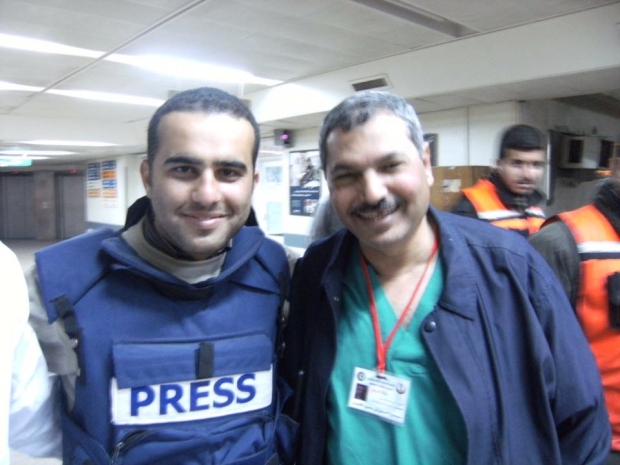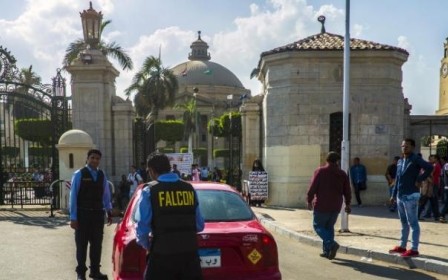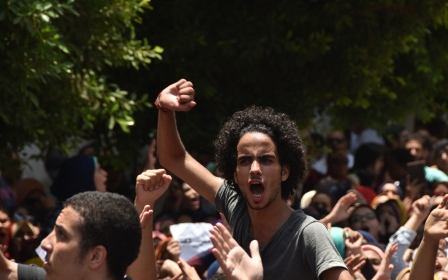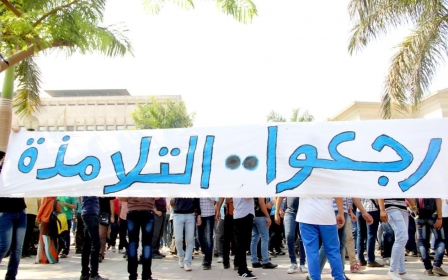Bittersweet triumph of Egyptian star student whose father was jailed by Sisi
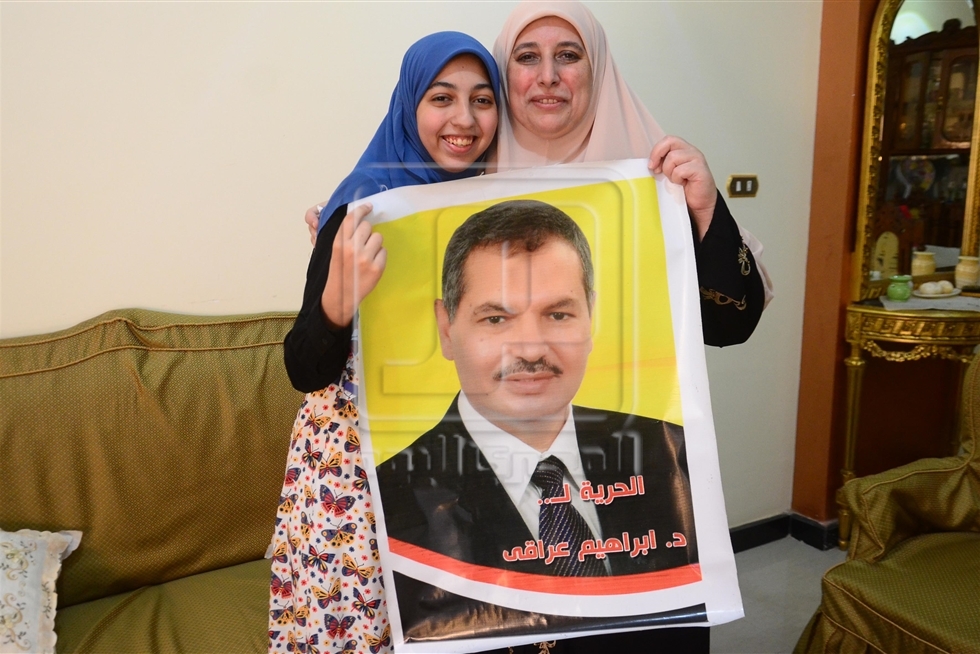
For Amira Eraqi, an Egyptian high school student from the city of Mansoura, sitting her exams and waiting for the results was - as it is for millions of students worldwide - a time of intense emotions.
But for her and her family, there was one major difference that added a sad note to the mix of feelings: her father has been a political prisoner in Egypt for the past two years. This meant that the sigh of relief and jubilation at her results was mixed with bittersweet feelings over her father's incarceration.
Arrested on 10 January 2014, Dr Ibrahim Eraqi, a renowned doctor in the field of nephrology and hailed as a hero for his volunteer work in hospitals in Gaza during the 2009 war, was accused of being a member of the now outlawed Muslim Brotherhood. Charged with numerous offences, including incitement to violence and belonging to a banned organisation, Eraqi was sentenced to life in prison in May 2015.
Since his arrest the only real contact Amira has had with her father has been through the iron bars separating them in Wadi Natroun Prison.
Amira always misses her father, but this summer there was exciting news that she was desperate to share with him. She had been ranked as the top science student in the whole of Egypt, scoring a phenomenal 409.5 out of 410 marks.
The top science student in Egypt
The Egyptian Minister of Education, El-Helali al-Sharbani, held a press conference in which he named and praised the top students graduating from high school including Amira.
Amira visited her father in Wadi Natroun prison to share her amazing achievement. “I wanted to give him something to be happy about, to show him what I’ve accomplished. I had been through a difficult time, trying to cope with my father’s absence, trying to deal with the constant news of exam postponements, and reports of exams being leaked, but I did it, and I couldn’t wait to show him.”
While her happiness may have been incomplete, her father’s joy at her results, and a heartfelt poem he had written for her went a long way to lifting her spirits. “I couldn’t have done it without him and his prayers,” she says.
Yet her moment of happiness was short-lived after people discovered her father was a political detainee and Amira made comments critical of Sisi. In what was meant to be a private moment of celebration for Amira and her family, they suddenly found themselves embroiled in a political conflict between both supporters and opponents of the government of President Abdel Fattah al-Sisi. Complaints were submitted against her, demanding that she be brought to justice and charged with "treason" for not showing enough gratitude to Sisi who "rescued" her and for insulting the army that "protected her".
Along with the unwelcome glare of the intense media scrutiny came the heightened awareness of her father’s absence, which she felt even more acutely than usual. What should have been a moment of joy for her family, quickly became a media circus with them receiving offensive calls and abusive messages. “It’s too much for one person,” her sister says sadly, “I don’t think she wants to talk about it anymore.”
Social media rallies in support of Amira
Traditionally, the Egyptian minister of education calls students who have excelled in their studies and who have been ranked as the country's best and brightest students. However, that was not the case with Amira who discovered she came out on top from the television. “I didn’t even know. No one called me. I actually found out from the news,” Amira said.
As criticism against the Ministry of Education grew, with many questioning their silence, social media users took to Twitter and Facebook to congratulate Amira with the Arabic hashtag #Congratulations_Amira, a welcome expression of recognition and solidarity with a young girl caught up in a political whirlwind.
The spokesperson for the minister of education, Basheer Hassan, was quick to deny claims that the reason Amira did not receive a congratulatory call was because of her father's links to the banned Muslim Brotherhood.
“Obviously, we don’t keep a note written next to the excelling students’ names saying that their father is or is not a member of the Muslim Brotherhood,” Basheer Hassan stated in a phone-in to an Egyptian TV programme. “There are 93 students, he didn’t have the time to call them all, [he] only managed [to call] about six or seven.”
The offence she feels goes much deeper than a simple call though. “How can I go to a ceremony and be presented with an award by the very people who have my father behind bars?”
Relatives' guilt
Amira is not alone in her struggle to balance her student life and her personal one. With the number of political prisoners in Egypt reaching an all-time high of an estimated 50,000, many children have found themselves struggling to cope with their studies amid the trauma of having a loved one in prison.
“Students generally have to struggle to set their revision timetable, to find a way to fit every single subject into the limited time allotted and to work around it,” says Mustafa, the brother of another detainee. “But for us, we need to find a way to fit visits in too. We need to factor in the wait that will be inflicted on us during this time, the amount of bribery that needs to be paid to guarantee us a visit. We need to second guess how much time we’ll be allowed to sit with them this time. Will it be thirty-five seconds, or five minutes.”
Guilt becomes a big part of students’ lives, knowing that while their family and friends’ lives have been put on hold because they are behind bars, their own lives continue. “Sometimes, I'm mid-laugh, and then I remember… and the laughter fades, even when I know that’s not what they would want. Day after day, year after year, moments are being stolen from them and from us,” Mustafa explains.
Crackdown on students
“Many of my fellow students have been arrested, and even killed on campus. How can I ignore everything they’ve been through, step on them and go to a ceremony?” Amira responds when asked if she would attend a ceremony to celebrate her achievements.
A key force in the movement for political change has long been student activism and with the Egyptian government's ever widening crackdown on dissent, an uneasy relationship exists between the students and those in power.
Since the coup that removed former president Mohamed Morsi, thousands of protests have erupted on campuses. They occur on an almost daily basis, all of which have been dealt with brutally and swiftly by Sisi's forces. Hundreds of students have found themselves expelled: al-Azhar University alone has expelled 419 students and hundreds more have been incarcerated.
Cooperation between security forces and university staff swiftly became standard, with security guards often locking students up until the arrival of army officers who then rounded them up. Menna Mustafa, with her two friends, Yosra al-Khateeb and Abrar al-Anany, one day found their campus being stormed by thugs, who trapped them in a room until security officers could arrive.
Mustafa and Anany were released after questioning. However, the dean of Mansoura University stepped in and asked for their continued detention. The irony is that while police officers insisted that they arrested the girls based on a request from the university security guards, “in the same hearing, a letter from the security department at Mansoura University was submitted, stating that the girls didn’t take part in the violence and asking for their release,” Heba, Menna Mustafa’s sister, tells MEE.
Despite the conflicting statements, and with neither the university’s security nor police officers providing any basis for the arrest, and with the only evidence submitted being videos dated weeks after their arrest, the girls were sentenced to three years in prison.
Kidnappings from the school gates and enforced disappearances are on the rise in Egypt, with children and students being the main targets. Disappearances peak during exam seasons, as military trucks loiter outside exam halls waiting for students to leave and then pick them up in droves.
Egyptians have rightly hailed Amira's stunning academic success, which is made all the more remarkable in the current political climate. For her and all of her fellow students, while revision and exams must continue and life must go on, there is no doubt that being a student in Sisi’s Egypt remains a very real occupational hazard.
Middle East Eye propose une couverture et une analyse indépendantes et incomparables du Moyen-Orient, de l’Afrique du Nord et d’autres régions du monde. Pour en savoir plus sur la reprise de ce contenu et les frais qui s’appliquent, veuillez remplir ce formulaire [en anglais]. Pour en savoir plus sur MEE, cliquez ici [en anglais].


